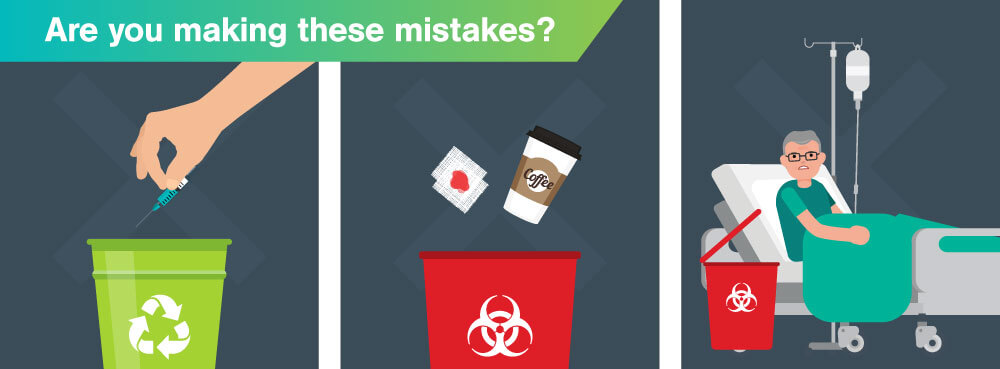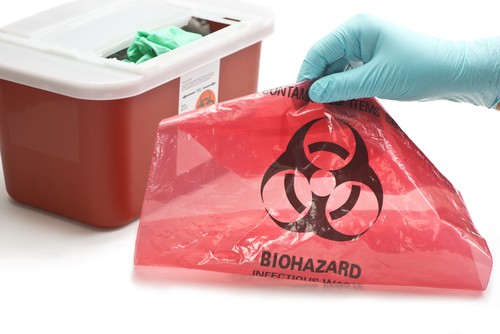Comprehensive Medical Waste Disposal Providers: Ensuring a Healthy Atmosphere
Wiki Article
The Relevance of Appropriately Taking Care Of Medical Waste
Proper monitoring of clinical waste is of utmost relevance in medical care facilities. The handling, storage space, and disposal of medical waste require strict adherence to guidelines and policies to make certain the safety and security of patients, medical care employees, and the atmosphere. Improper management of medical waste can posture serious health risks, consisting of the transmission of contagious conditions and injuries from sharp things. Improperly disposed of clinical waste can have damaging results on the setting, contaminating water resources and soil. Medical care centers have legal and regulatory obligations to effectively handle medical waste, and failure to abide can result in charges and lawful repercussions. By implementing finest practices for secure handling and disposal of clinical waste, healthcare experts can minimize these dangers and add to a more secure and healthier atmosphere for all. Sufficient education and training on waste management are critical for medical care experts to accomplish their obligations in this location.Health And Wellness Dangers Connected With Improper Waste Monitoring
Incorrect monitoring of medical waste positions significant health dangers to both health care employees and the general public - WasteX Medical Waste Disposal. Medical waste, which consists of sharps, transmittable materials, pharmaceuticals, and radioactive substances, requires appropriate handling and disposal to protect against the spread of infections, injuries, and direct exposure to harmful substances
One of the primary health dangers associated with incorrect medical waste administration is the transmission of transmittable diseases. Health care workers who enter into contact with polluted waste may get conditions such as HIV, liver disease, or other bloodborne virus. Likewise, if clinical waste is not effectively gotten rid of, it can pollute the environment, water sources, and even food, leading to the spread of diseases within the area.
Improper waste management can also bring about injuries, especially from sharps such as needles, scalpels, and broken glass. Accidental needle punctures can lead to the transmission of bloodborne diseases, while cuts from sharp things can trigger extreme wounds and infections.
Furthermore, the inappropriate disposal of pharmaceutical waste can bring about the contamination of water supplies. When run out or unused medicines are flushed down the toilet or thrown out inappropriately, the chemicals can seep into water resources, influencing aquatic life and possibly entering the human food chain.
Environmental Impact of Incorrectly Disposed Medical Waste
One of the substantial consequences of insufficient administration of medical waste is its harmful impact on the atmosphere. Poorly disposed medical waste poses a significant risk to ecosystems, water bodies, and the total balance of the setting. WasteX Medical Waste Disposal. The hazardous products contained in medical waste, such as contagious representatives, pharmaceuticals, and chemicals, can pollute soil, air, and water, bring about prevalent pollution and deteriorationWhen medical waste is not correctly segregated, treated, and disposed of, it can discover its means right into water bodies via improper landfill methods or prohibited unloading. This can cause the contamination of groundwater and surface area water, influencing aquatic life and potentially polluting drinking water resources. The release of hazardous chemicals and pharmaceuticals into the environment can disrupt environments and damage both animal and plant types.
Additionally, incorrect incineration of medical waste can release poisonous pollutants, consisting of furans and dioxins, into the environment. These contaminants have actually been connected to numerous wellness problems, consisting of respiratory system issues, reproductive conditions, and even cancer cells. The launch of greenhouse gases during incineration also adds to climate change.
To minimize the ecological effect of improperly disposed medical waste, it is important to execute proper waste monitoring techniques. This includes partition of waste at the resource, suitable treatment methods, and secure disposal methods. By doing so, we can reduce the air pollution and secure the atmosphere from the hazardous effects of clinical waste mismanagement.
Governing and legal Commitments for Medical Care Facilities
In order to deal with the ecological effect of incorrectly disposed medical waste, health care centers are needed to adhere to governing and legal commitments. These responsibilities are established to guarantee the correct handling, storage, transportation, and disposal of medical waste in a ecologically liable and safe way.Among the essential lawful obligations for medical care centers is to obtain the essential permits and licenses for taking care of medical waste. This consists of acquiring a waste generator recognition number and complying with federal, state, and regional regulations. Health care centers must likewise maintain detailed records of the types and amounts of medical waste generated, in addition to the methods used for its disposal.
In addition, medical care facilities must carry out correct partition and packaging treatments for different kinds of clinical waste, such as sharps, contagious waste, and pharmaceutical waste - medical waste removal. This includes utilizing watertight containers, biohazard bags, and sharps containers that meet governing criteria
Health care centers are likewise in charge of ensuring that their staff obtain ideal training on the appropriate handling and disposal of medical waste. This consists of training on infection control, individual safety equipment, and waste management methods.
Best Practices for Safe Handling and Disposal of Medical Waste
To make certain the secure handling and disposal of clinical waste, medical care centers need to apply ideal practices. These techniques are necessary to protect the health and wellness of both healthcare workers and the public. The proper administration of clinical waste is important in stopping the spread of transmittable diseases and decreasing ecological contamination.One of the very best practices for safe handling and disposal of medical waste is partition. Medical care centers need to separate various kinds of clinical waste, such as sharps, transmittable products, and pharmaceutical waste, to stop cross-contamination. Proper next labeling and shade coding of waste containers likewise play an essential function in making certain the proper partition of medical waste.
Another vital ideal method is the usage of appropriate containers for keeping and delivering medical waste. These containers ought to be leak-proof, puncture-resistant, and properly sealed to avoid any feasible launch of hazardous products. Additionally, health care centers need to develop clear methods for the collection, storage, and transport of clinical waste to reduce the threat of direct exposure and contamination.
Furthermore, health care centers have to educate their staff on the appropriate handling and disposal of medical waste. Normal training sessions and correspondence course must be performed to keep medical care employees updated on the most up to date standards and laws. This will aid make sure that everybody involved in the procedure knows the prospective dangers and is furnished with the needed expertise and skills to handle medical waste safely.
Education And Learning and Training for Health Care Professionals in Waste Monitoring
Healthcare specialists need thorough education and training in waste administration to guarantee the appropriate handling and disposal of clinical waste. The administration of medical waste is a critical component of healthcare operations as it directly impacts the health and wellness of both medical care employees and the public. Correct education and learning and training outfit healthcare professionals with the required knowledge and skills to get rid of and manage of clinical waste in a eco accountable and risk-free manner.Education and training programs for healthcare professionals in waste monitoring cover a series of subjects, consisting of the classification and segregation of clinical waste, appropriate product packaging and storage space, transport and labeling demands, and using personal protective equipment. These programs also emphasize the relevance of adherence to regional, nationwide, and global laws and guidelines governing clinical waste management.
By obtaining detailed education and learning and training in waste administration, healthcare specialists can successfully minimize the risks connected with medical waste, such as the transmission of transmittable illness and the possible damage to the environment. WasteX Medical Waste Disposal. In addition, well-trained specialists can identify and carry out ideal practices that promote sustainability and effective waste management practices within health care facilities.
Continual education and training in waste administration must be an ongoing top priority for medical care professionals, as waste management methods and laws may progress gradually. By remaining current with the most recent growths in waste management, healthcare specialists can make certain that they are furnished with the expertise and abilities essential to make enlightened decisions and add to the general renovation of waste monitoring techniques in healthcare settings.

Conclusion
In conclusion, proper administration of medical waste is critical to minimize health and wellness threats and decrease the ecological impact. Healthcare centers have regulative and legal responsibilities to make sure risk-free handling and disposal of medical waste. Adhering to best techniques and offering education and learning and training for medical care experts in waste monitoring are crucial for keeping a healthy and secure setting. By sticking to these guidelines, healthcare centers can protect public health and preserve the honesty of our ecological communities.
Healthcare specialists require detailed education and learning and training in waste management to make certain the proper handling and disposal of clinical waste - medical waste disposal service. The monitoring of clinical waste is an essential component of health care procedures as it straight affects the health and security of both medical care employees and the general public
Report this wiki page